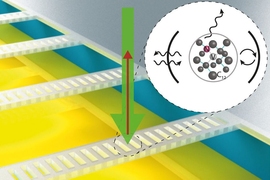The Department of Electrical Engineering and Computer Science (EECS) has announced the promotions of Tomás Palacios, Devavrat Shah, and Russ Tedrake to full professor and Dirk Englund to associate professor without tenure. The promotions are effective July 1.
Tomás Palacios has made groundbreaking contributions to electron devices through the use of new materials and nanotechnology. His work includes both advancing the design, fabrication, and application of semiconductors such as gallium nitride (GaN), ubiquitous in today’s solid-state lighting and power electronics, as well as developing some of the first device concepts and applications of graphene and other two-dimensional materials. In addition to leading endeavors such as the MIT GaN Energy Initiative, Palacios has made important contributions to our undergraduate classes from freshman through senior levels, and has taken on prominent service activities such as the directorship of the EECS VI-A MEng Thesis Program.
Devavrat Shah is a leading figure in the area of statistical inference and stochastic networks. His seminal contributions span a variety of areas including resource allocation in communications networks, inference and learning on graphical models, and algorithms for social data processing including ranking, recommendations, and crowdsourcing, among many others. He has received many accolades for his work, including numerous prize paper awards and the Erlang Prize for outstanding contributions to applied probability. Shah is also a highly valued teacher, has been highly active in curriculum development, and has taken a leading role developing educational aspects in the center for statistics that is part of the new Institute for Data, Systems, and Society.
Russ Tedrake is a world leader at the intersection of robotics and control theory. He pushes the frontier of humanoid and flying robots by developing both better theory and remarkably novel algorithms. In the DARPA Robotics challenge, his team has demonstrated robots capable of walking autonomously over rough terrain as well as climbing stairs. He and his students have also demonstrated robots that can fly at high speeds using only a commodity cell-phone processor. Tedrake received universal recognition for his ground-breaking work and is the winner of numerous best-paper awards from influential robotics conferences. A superb teacher and mentor, Tedrake has vastly enriched EECS curriculum, and his edX courses are followed by thousands of students.
Dirk Englund researches the development of photonic and quantum devices and systems and their use in quantum computation, communications, and sensing. Quantum-based approaches have promise for revolutionary impact on computation, secure communications, high-precision sensing, and many other areas. Among other advances, Engund has made important contributions in each of quantum and photonic devices, quantum information processing, quantum communications, and quantum sensing, and he has become widely recognized for his work in these areas. Englund has also been making valuable educational contributions to the department, including introduction of a new combination undergraduate and graduate course, 6.S077/6.S977 (Fundamentals of Photonics).










